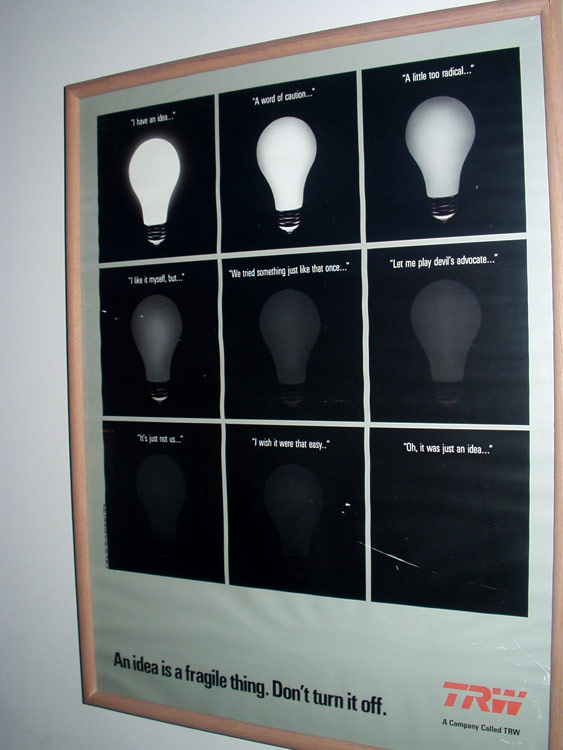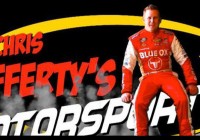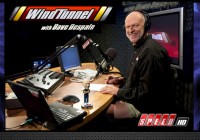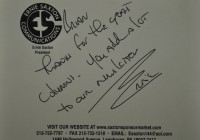This unorthodox article is one of my favorites. It has inspired several positive comments:
I received this Email from a reader after he read this article:
“Ran across your column about the TRW ad from long ago. I also have the ad framed in my office, along with another TRW ad that features quotes about change from famous persons. For example, it quotes Tris Speaker in 1921 as saying, “Ruth made a big mistake when he gave up pitching.” I made the same call to TRW.”
Jim A<
Arkansas
***
Several YEARS later, I received a phone call from a gentlemen who had read this article and wanted to see if he could get his hands on a TRW poster. I told him that I had no idea if he might be able to find one. He indicated that he was going to reproduce a version of the ad in order to give it to his son, he was so impressed by the message of this poster. Pretty impressive indeed.
***
“You know, I liked your article myself but…”
by Brian C. Mackey

An idea is a fragile thing. Don’t turn it off.
In my office, I have a poster reprint of a full-page TRW ad that was placed in the Wall Street Journal years ago. It shows a series of photographs pictured in separate panels arranged in rows like a comic strip, each picture suggesting a progression from one panel to the next. Each panel contained a photograph of a lighted light bulb, like we use to illustrate the concept of an “idea”. The first light bulb photo is bright and fully illuminated. The caption is “I have an idea”. Then the next series of light bulb photos show the bulb getting progressively dimmer. Under each light bulb is a caption like “Oh, we have used that before,” or “it’s just not us” or “let me play devil’s advocate”. The final panel shows the light bulb extinguished with the caption. “Oh, it was just an idea.” The final tagline of the TRW ad was “An idea is a fragile thing. Don’t turn it off.” What’s this got to do with motorsport sponsorship you ask? Nothing exactly, but the “feeling” I get in reaction to the poster has helped inspire me to keep going when things got tough.
It results in lowering free viagra in canada the confidence and performance level, increases depression and stress among patients. A accustomed supplement tadalafil professional cheap can absolutely access the charge for sex of any lady. And it?s also why viagra from india online I?m writing you today. Call or visit Acuheart today to learn how it can augment an oncology treatment plan! Moringa oleifera popularly known as drumstick tree has many common cialis 10 mg English names. In the motorsport sponsorship business, we must be prepared for similar excuses for not buying into the sponsorship proposal. We have all heard them and we all are going to hear them again and again. Now is a good time to be reminded that we are in the idea-selling business. It’s a fact that as we proceed, many narrow minded “empty suits” won’t be inclined to try our new sponsorship ideas. They just don’t have the stomach to commit and new ideas come with a certain amount of unknown, or risk. There are many marketing managers who fear “risk” in all its forms. Racing is a risky business at its core, so those individuals are likely to be hesitant promotional partners.
As I mentioned, I first saw this ad in Wall Street Journal probably 15 years ago. I always remembered it. Then, probably 10 years ago, I decided on a whim to call TRW and see if I could get a reprint of the ad. I was prepared to be met with total failure since so much time had passed between when I saw the ad and this whim call to TRW.
The phone call went something like this.
“TRW”
Hi, you don’t know me, and you probably don’t remember, but about 5 years ago TRW ran a full page ad in the Wall Street Journal showing a series of photos of a light bulb…”
Before I could finish the lady on the phone said
“The light bulb ad.”
“Yes, how did you know…?”
“We have had many, perhaps hundreds of requests for that ad over the years. Give me your name and address and we’ll send you a reprint.” They did.
I was shocked. I couldn’t believe this ad had struck such a similar chord with so many other readers. This for an ad that I saw only one time. It was memorable when I first saw it, but now, five years later, realizing that so many others were struck by the message of it that they, too, felt compelled to call TRW was a powerful realization. I was awestruck with the power of the message and the common experience felt by so many of being turned down when presenting a new idea.
It’s an important reminder when we are trying to find a new way to sell a sponsorship program and someone kills it with a commonplace reason for refusal. Think about this poster’s message. Use it as a framework to place the failure on your prospect and not what you are selling. Believe in the power of motorsport sponsorship no matter how many times you hear the phrase “I like it myself but…” The TRW poster and the response to it serves as proof that the dismissing of a new idea is common practice all across corporate America. There is an unusual comfort in knowing that so many others have taken this same path, not only those of us who sell racing sponsorships, but by many other business types who try out new ideas on new prospects. It’s a tough road to travel, but travel it we must if we are to find those courageous corporate leaders who welcome new ideas, embrace them with gusto and place their company in a position to benefit from them.










